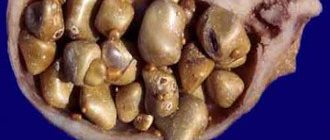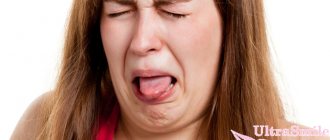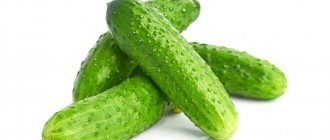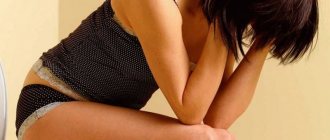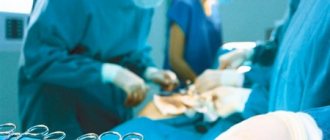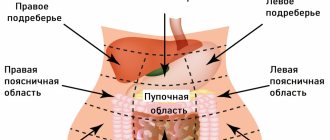Mechanism of development of hemorrhoids
Hemorrhoids are a disease of the anorectal region associated with disruption of the structure and functioning of the internal venous nodes of the rectal plexus.
Normally, the venous walls have moderate elasticity and tone. Under the influence of provoking factors, the vessels of the anus and rectum become excessively filled with blood, lose their elasticity and become deformed. As a result, nodes characteristic of hemorrhoids are formed, which cause complications of varying degrees of severity and severity. Hemorrhoidal cones can fall out of the rectum, become inflamed, and bleed. In some cases, a bacterial infection with the formation of suppuration joins the inflammatory process.
The patient complains of a sensation of a foreign body and a feeling of heaviness in the rectal area, itching and burning in the anus, pain and bleeding during bowel movements, discomfort in a sitting position and while walking.
Provoking factors for hemorrhoids include chronic constipation, causing excessive straining, frequent diarrhea, obesity, pregnancy, and pathologies associated with vascular weakness.
The risk group includes representatives of certain professions who are forced to sit or lift heavy objects for a long time. These are office workers, truck drivers, weightlifters, and loaders.
Consequences of hemorrhoids
Hemorrhoids can develop asymptomatically for a long time, only rarely causing itching, burning or a sensation of a foreign body in the anus. As a rule, patients do not pay special attention to these signs and are in no hurry to seek help from a doctor. But this approach to your health is reckless, because complications of hemorrhoids can arise at any time.
If you do not pay attention to the presence of signs of hemorrhoids and do not start therapy, the disease will progress - hemorrhoids will begin to enlarge and fall out with each bowel movement. If after this the person does not begin to take any action, the cones will fall out with any tension in the abdominal and pelvic floor muscles - when coughing, sneezing, walking.
After some time, hemorrhoids will begin to fall out at rest and it will be impossible to set them without medical help. As a rule, this phenomenon occurs in the last stage of hemorrhoids. Here, the risks of developing complications in the form of thrombosis, necrosis (tissue death), and strangulation increase several times. The only way to avoid their occurrence is to go to an appointment with a proctologist at the first signs of hemorrhoids and begin treatment.
Why are hemorrhoids dangerous?
The appearance of the first signs of hemorrhoids does not always cause concern for the patient. In the first stages of the disease, hemorrhoids do not fall out or are easily reduced on their own; there are no significant complaints or discomfort. But this state of affairs is deceptive.
Hemorrhoids can progress rapidly, moving from the first to the fourth stage in a few months. Moreover, at the last stage, hemorrhoids not only cannot be reduced, but also fall out with the slightest physical exertion, coughing and sneezing.
Complications are most often observed in the third and fourth stages of hemorrhoids. Therefore, it is so important to recognize the disease in the early stages. This will not only reduce the risk of complications after hemorrhoid surgery, but will also allow you to avoid surgery altogether.
Anemia
Anemia, or anemia, is a blood disease associated with a decrease in hemoglobin levels and a decrease in the number of red cells in the bloodstream. One of the causes of anemia is bleeding during bowel movements, which, as the disease progresses, becomes more abundant each time.
Along with blood loss, beneficial iron-containing microelements are removed from the body. Their deficiency leads to disturbances in hemoglobin synthesis and red blood cell recovery. An extreme degree of iron depletion in the blood can lead to damage to the heart muscle.
The acute form of anemia is accompanied by the following symptoms:
- pale skin;
- bluish tint of lips;
- sticky cold sweat;
- dizziness;
- noise in ears;
- nausea;
- periodic urge to vomit;
- rapid heartbeat and breathing;
- decreased blood pressure;
- poor palpation of the pulse;
- fainting;
- low body temperature.
Hemoglobin levels during rectal bleeding can reach a critical level of 50-70 g/l with a normal range of 120 g/l.
The transition of hemorrhoids to a sluggish stage entails chronic anemia. The patient may complain of fatigue, dizziness, frequent headaches, constant weakness, brittle nails and hair loss. Swelling of the face, pale skin, and a slight increase in body temperature are also observed.
Rectal fissures
Impaired elasticity of rectal tissue with hemorrhoids leads to damage to the mucous membrane of the rectum or skin in the preanal area. The thinned mucous membrane easily develops cracks during the passage of feces during defecation.
The danger of the condition lies in the fact that the cracks create suitable conditions for the development of pathogenic microflora. Pathogenic bacteria from feces enter the wounds, causing extensive inflammation with the likelihood of suppuration.
Symptoms of a rectal fissure:
- pain – sharp or mild depending on the type of damage;
- drops of blood on paper after using the toilet;
- spasm and increased sphincter tone;
- burning and itching in the anus caused by the secretion of mucus from the rectum.
Thrombosis of hemorrhoidal veins
Chronic hemorrhoids can be complicated by thrombosis of venous nodes. Lifting weights, excessive straining during bowel movements, pregnancy and childbirth often lead to trauma to the inner wall of the hemorrhoid.
As a result, venous blood stagnates in the vessels, platelets stick together and the blood protein fibrin falls out. This is how a blood clot is formed, which subsequently closes the lumen of the vessel, causing circulatory problems in the pathological area.
Thrombosis can develop simultaneously on external and internal hemorrhoids, but most often the external localization of the process is observed.
The main symptom of thrombosis is severe pain. Pain in the anal area is not associated with bowel movements and may appear suddenly, even at rest. A characteristic “duck walk” is noted - this is how the patient tries to alleviate the condition caused by the painful pressure of the thrombosed node. Painful sensations are accompanied by swelling of the anorectal area, burning and itching.
Progressive thrombosis causes inflammatory processes in the anal area, which subsequently lead to necrosis of the hemorrhoid and tissue death.
You can find out more detailed information about hemorrhoidal thrombosis by reading the article by our proctologist.
Bleeding
The appearance of blood during bowel movements is the main sign of hemorrhoids. Dilated vessels of the rectum can bleed at the slightest tension or straining. And if in the first stages of the disease there are only minor traces of blood on toilet paper, then advanced hemorrhoids can lead to heavy bleeding.
The presence of blood spatter is an indication for immediate hospitalization of the patient. Profuse bleeding can be fatal.
The consequences of bleeding hemorrhoids are most often associated with the development of chronic iron deficiency anemia.
Anal sphincter weakness
The sphincter is a ring of muscle located in the distal part of the rectum. In a healthy person, the muscles are in good shape, tightly closing the intestinal canal after emptying.
When the sphincter is weakened, the intestinal contents - solid and liquid feces, gases - are not retained inside. A person becomes unable to control the processes of bowel movement, which makes life dysfunctional.
Weakness of the sphincter is often a consequence of chronic constipation, trauma and neoplasms of the rectum, and occurs as a complication after unsuccessful removal of hemorrhoids and previous inflammatory bowel diseases.
Disruption of the sphincter does not threaten the patient’s life, but it significantly complicates it. A person cannot visit public places, go to work or visit.
Infringement of dropped nodes
The fourth stage of hemorrhoids, when the nodes are no longer able to reduce themselves, often leads to their strangulation. The pathogenesis of this complication in hemorrhoids is also associated with the work of the anal sphincter.
An enlarged and deformed hemorrhoidal vein is a weak formation that can be easily compressed under the influence of a strong sphincter muscle. Just one small contraction – a sudden movement, straining or defecation – is enough for the knot to become pinched.
Signs of complications:
- severe pain syndrome, pain intensifies in a sitting position;
- feeling of fullness and a foreign body in the rectum;
- swelling and redness of tissue in the anus.
The process of infringement occurs in stages and does not immediately cause characteristic symptoms. Ignoring the first signs of strangulated hemorrhoids leads to even more serious consequences, such as necrosis.
Necrosis of strangulated nodes
Pinching of the node leads to impaired blood circulation in the tissues. They are no longer supplied with oxygen and nutrients, and as a result, the hemorrhoid begins to die. Upon examination, it is observed to be blue and even black.
Necrosis can be partial, when only part of the hemorrhoid dies. With complete necrosis, tissue in neighboring areas begins to deteriorate, the pathological process expands, with the formation of open ulcers. Hemorrhoids with such complications can develop into blood poisoning.
The death of a hemorrhoid may be accompanied by severe bleeding. The situation requires urgent surgical intervention!
The signs of necrosis of the cones are the same as when the fallen nodes are pinched. The process occurs with acute inflammation, so an increase in body temperature is often observed.
Paraproctitis
Paraproctitis is an inflammation of the adipose tissue surrounding the rectum. Hemorrhoids are often a provoking factor for this dangerous pathology. Through anal fissures, ulcers and injuries, pathogenic bacteria enter the perirectal tissue.
The inflammation they cause is accompanied by the appearance of purulent fistulas localized in the anal area. Fistulas can occur as a complication after hemorrhoid surgery when an infection gets into the surgical wound.
Signs of the disease:
- high body temperature;
- pain in joints and muscles;
- weakness and chills;
- painful urge to defecate;
- pain covering the entire pelvic area - lower abdomen, anus, rectal area;
- increased sweating;
- pain when urinating.
Fistulas with paraproctitis do not heal on their own, but require competent surgical intervention and the use of antibiotics.
Prevention of complications of hemorrhoids
Even with successful surgery, the risk of hemorrhoid recurrence remains if the risk factors are not eliminated. These same factors reduce the effectiveness of therapy in the early stages of the disease and increase the risk of adverse consequences. To eliminate them, the following measures are necessary:
- giving up bad habits, smoking and alcohol - the traumatic effect of nicotine on blood vessels has been proven; in terms of its effect on hemorrhoids, it is as unfavorable as alcohol, which reduces blood viscosity;
- reduction of physical activity - it is forbidden to carry heavy loads, engage in active sports, especially those associated with increased intra-abdominal pressure (strength sports) and sitting (cycling, motorsports, rowing);
- exclusion of sedentary work - occupational hazards must be compensated, and this cannot always be done in industrial and office environments. As a last resort, it is worth reducing the number of sitting hours to 3-4, doing a warm-up every 1-2 hours, installing a special seat;
- a balanced diet with a high fiber content, a decrease in spicy, fatty, fried, smoked foods, marinades in the diet;
- normalization of body weight if necessary (by slightly reducing the calorie intake and increasing physical activity);
- stool control . If the problem cannot be corrected through nutrition, you should consult a doctor who can prescribe mild laxatives.
Complications after surgery to remove hemorrhoids
Surgical intervention after diagnosing hemorrhoids is resorted to only in 20% of cases. This is a radical treatment method that is highly effective, but, like any operation, it can cause complications. These include:
- bleeding – occurs as a result of injury to the sutures by solid intestinal contents;
- narrowing of the lumen of the anal canal - caused by improper application of surgical sutures;
- rectal prolapse – prolapse of the rectum as a result of damage to its nerve endings;
- suppuration of postoperative sutures - develops when the hygiene instructions of the attending physician are not followed.
In addition to these complications, the patient is concerned about pain, which is inevitable with any surgical intervention. Patients may complain of urinary retention and constipation.
Read about how to treat hemorrhoids after surgery, including in order to prevent the development of complications, in the material of our specialist.
When does the acute stage of inflamed hemorrhoids occur?
What are acute and chronic hemorrhoids? These are different types of the same disease. And if the chronicity of the pathological process implies a calmer course, then in the event of an exacerbation the situation worsens significantly.
That is why every patient should have an idea of the factors that aggravate the course of the pathology. These “provocateurs” must be excluded if a person does not want to worsen his condition.
- Heavy physical activity. Due to a sudden lifting of something heavy or due to constant excessive loads, the harm from which gradually accumulates, an exacerbation of hemorrhoidal disease often occurs.
- Problems with bowel movements. These include both prolonged constipation and prolonged diarrhea. Both of these unpleasant processes lead to inflammation and damage to the hemorrhoids, as a result of which they fall out or become pinched. Infringement occurs due to spasm of the anal valve.
- Non-compliance with the diet. An exacerbation of hemorrhoids often occurs after enthusiastic consumption of foods such as spices, smoked meats, marinades, saltiness, and soda. Of course, alcohol is also extremely harmful. All of them lead to increased blood flow to the pelvic organs, namely to the anal canal.
This provoking factor often works during holidays and other feasts. Within just a couple of days after abusing harmful products, symptoms worsen and the condition worsens significantly.
- Low mobility and staying in one position. Prolonged stay on your feet or in a chair leads to oversaturation of cavernous formations with blood, resulting in their swelling and increase in size. In particularly difficult situations, the nodules fall out of the anus and become pinched.
Low mobility and staying in one position often leads to the development of hemorrhoids.
When hemorrhoids worsen, the doctor, first of all, relieves the pain syndrome, and only then finds out the cause of the deterioration in order to eliminate its influence in the future.
The importance of timely consultation with a doctor
The consequences of complications and removal of hemorrhoids can be avoided if you do not self-medicate and contact a proctologist at the first symptoms of the disease. In 80% of cases, it is possible to avoid surgery and use conservative treatment methods.
Only an experienced doctor will be able to accurately diagnose and draw up an optimal treatment regimen, taking into account individual characteristics and concomitant diseases. He will prescribe recommendations on rational nutrition, hygiene, work and rest schedule.
How to treat acute hemorrhoids?
Hemorrhoids in the acute phase should be treated as quickly as possible, since delay leads to undesirable consequences. Therapy for aggravated varicose veins of hemorrhoidal veins may be delayed, since it is important not only to relieve pain, but also to improve the general condition of the patient.
If acute hemorrhoids are diagnosed, the question of what to do is not at all idle. Most often, a whole range of measures is used, including conservative treatment and surgical intervention.
Medicines
The main and primary task is to relieve a person from acute pain syndrome, since it is impossible and unnecessary to endure these sensations. For this purpose, proctologists prescribe various medications, focusing on the type of disease (external or internal) and the severity of symptoms.
The choice of pharmaceutical drugs for pain is wide: rectal suppositories, ointment medications, tablet forms of medication. Locally acting drugs provide a faster effect, which is why they are most often prescribed by specialists.
- Suppositories for acute hemorrhoids
Treatment of hemorrhoids in the acute stage involves the use of certain medications that help with pain, inflammation and other negative symptoms:
- Relief Advance, Posterizan, Procto-Glyvenol, Anestezol for hemorrhoids effectively relieve pain, since they contain anesthetics that quickly act on hemorrhoids. Candles with belladonna are also used;
- Relief Ultra, Proctosedyl M, Ultraproct for hemorrhoids, among other things, contain hormonal components that are designed to fight inflammatory processes in hemorrhoidal cones and severe itching;
- Hepatrombin G, Nigepan contain the substance heparin, which has antithrombic properties. The drugs are prescribed if acute hemorrhoids are accompanied by the formation of blood clots and blood liquefaction;
- for severe pain, suppositories with adrenaline are often prescribed, which relieves even severe inflammation. The drug is produced in pharmacies according to a doctor's prescription.
Nigepan is prescribed if acute hemorrhoids are accompanied by the formation of blood clots and blood liquefaction.
- Ointment products
Many antihemorrhoidal medications come in two forms: suppositories and ointment medications. When a blood clot forms in an external node, drugs such as Hepatrombin G, heparin ointment, Troxerutin, Troxevasin are often used.
For severe pain and inflammation in external hemorrhoidal nodules, Proctosedyl, Relief Advance, Relief Ultra, Aurobin, Bezornil are prescribed.
The affected areas are lubricated with ointments; to increase effectiveness, you can make an application, secure it with a medical plaster, and leave it overnight.
- Pills
To enhance the effect, use tablets and capsules with a venotonic effect. Such medications help eliminate one of the main causes of varicose veins in hemorrhoidal veins - weakness of the walls of blood vessels.
Among the most common venotonics are:
- Troxevasin;
- Detralex;
- Venarus;
- Phlebodia 600;
- Ginkor forte.
Among the most common venotonics is the drug Phlebodia 600.
In addition, the doctor may prescribe non-steroidal anti-inflammatory drugs (Nise, Pentalgin) to reduce pain and the inflammatory process.
If the pain does not go away even after using the above medications, it is permissible to use an emergency measure. For example, a blockade of several injections of novocaine into the sacral area helps relieve even a severe attack of pain.
Surgery
“Ordinary” hemorrhoids require treatment; the acute period of the disease sometimes involves taking radical measures, for example, surgical intervention.
Such measures are taken in the absence of effect from conservative treatment methods. However, you should not be afraid of the word “operation”. In most cases, surgery relieves the patient of the problem for a long time or forever.
Modern proctological practice increasingly involves the use of minimally invasive (gentle) methods of surgical interventions, for example:
- thrombectomy - opening of a hemorrhoid, during which a blood clot is removed. Characterized by fairly rapid recovery;
- ligation with latex rings - an intervention in which the base of the nodule is compressed with a special ligature made of latex;
- disarterization - ligation of arterial vessels that feed hemorrhoidal cones using special instruments;
- laser or photocoagulation - cauterization of nodules using infrared or high-frequency narrow beams;
- sclerotherapy is an intervention in which a sclerosant is injected into the hemorrhoidal cone to help the walls of blood vessels stick together;
- cryodestruction – destruction of enlarged cavernous formations using liquid nitrogen.
Ligation with latex rings is an intervention in which the base of the nodule is compressed with a special ligature made of latex.
The listed techniques are quite effective, but it is necessary to understand that such methods are used only after the exacerbation has resolved.
That is why minimally invasive methods are carried out only after conservative therapy, which relieves severe pain, inflammation and other symptoms characteristic of worsened hemorrhoids.
The possibility of prescribing radical surgical interventions, for example, hemorrhoidectomy, cannot be ruled out. Such manipulations are indicated in particularly severe, advanced cases of hemorrhoids. They are characterized by greater trauma compared to minimally invasive methods.
Folk recipes
It should be understood that alternative medicine recipes and treatment of acute hemorrhoids at home without contacting a proctologist are a direct path to complications and negative consequences.
It is impossible to cure acute varicose veins of hemorrhoidal veins solely with the help of folk remedies! This condition requires emergency assistance from a qualified doctor.
The proctologist will determine how to treat hemorrhoids. He can recommend the following folk remedies that should be used in conjunction with medications:
- oil from sea buckthorn berries - when the nodes are located inside the rectum, tampons soaked in oil are inserted into the anus; for external nodules, lotions are made;
- ice suppositories - such drugs can reduce pain and stop bleeding;
- Potato suppositories - such remedies relieve pain and inflammation. “Torpedoes” are cut out of the fetus and inserted into the anus overnight.
Potato suppositories relieve pain and inflammation.
Let us repeat once again: you cannot be treated with alternative medicine methods on your own, without first consulting a proctologist.
This is fraught with undesirable consequences.
Danger for men
The consequences of hemorrhoids in men are observed by proctologists more often than in women. The stronger sex, embarrassed to contact a specialist, endures all the unpleasant symptoms. But in vain.
Bleeding is also dangerous for men, since a decrease in the amount of hemoglobin leads to oxygen starvation. Hence - dizziness, weakness, constant drowsiness.
Paraproctitis is a serious condition in itself, but if nearby tissues are involved in the infection process, inflammation of the prostate gland occurs.
Long-term, chronic inflammation of the anus, if left untreated, causes swelling and pustular rashes in the perineal area, and a sluggish inflammatory process can lead to problems with potency.
Constant discomfort, sensation of a foreign body, pain, itching, fear of talking about their problem often drives men to neurosis and leads to the appearance of psychological pressures.

